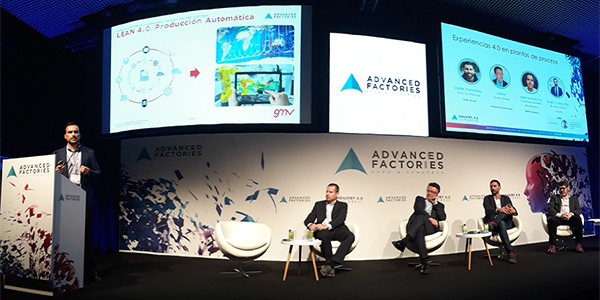GMV speaks about the advantages of Lean 4.0 for optimizing industrial plants

The term “Lean” was coined in the eighties of last century to define the production outlook based on maximizing the creation of value for the end client while trying to eliminate system wastage. To do so Lean focuses on the reduction of what have come to be defined as the 8 basic sources of waste: defects, overproduction, waiting, non-utilized talent, transportation shortfalls, excess inventory, unnecessary motion, and extra-processing. Blending this managerial model with Industry 4.0 gives birth to the Lean 4.0 concept, ushering in new groundbreaking and disruptive uses of technology to favor a more efficient industry with the necessary flexibility to adapt to specific, ongoing market needs.
At the Advanced Factories Congress Ángel C. Lázaro, Industry Business Partner of GMV’s Secure e-Solutions sector, has shared GMV’s vision of digitalization processes within Industry 4.0, giving some examples of the implementation of Lean 4.0-linked production-streamlining projects. This chat was part of the debating panel “4.0 experiences in processing plants” involving experts from Repsol Química, Celsa Group and Pervasive Technologies.
During the debate, GMV put forward some real use cases it is currently working on and the outstanding results already achieved. First and foremost he cited the use of artificial intelligence together with Big Data and cloud infrastructure to obtain predictive production processes. Under this system the data from diverse sources is used to adjust production to demand, cutting down the inventory and use of raw materials. In the pharmaceutical sector work is already underway on the use of patient data from diverse public bodies or open platforms to forecast epidemics and adjust the production of medication to suit. Another example can be found in the retail sector, where analysis of patterns and trends in internet and social media is used to offer clients new products to suit their particular interests.
Another case presented by Ángel C. Lázaro was flexible production, with short production runs and products with a high degree of personalization. In pursuit of these objectives we can now tap into such resources as industrial robotics, collaborative robotics, artificial intelligence and cloud computing, allowing us nowadays to switch between different production references (on the strength of mobility and programmability) or the use of Automated Guided Vehicles (AGVs) for the movement of merchandise on production lines and in stores. The advent of 5G, at practically real-time speed, will also enable all production and control logic to be hosted in the cloud.
Following on from this development of 5G-enhanced communications, the democratization of hardware and the Internet of Thinks will enable us to tap into all the information from any machine or corner of the plant to find out how a process is going and, in detail, how the diverse process components are behaving. We therefore now have to hand a great quantity of processed data to head off any deviations from the desired operational range.
“Upon setting up a Lean 4.0 project we should make sure not only that we know what we are going to do and how but also how and when we are going to finish, so we can carry through the whole project successfully”, argued Ángel C. Lázaro at the end of his speech.

